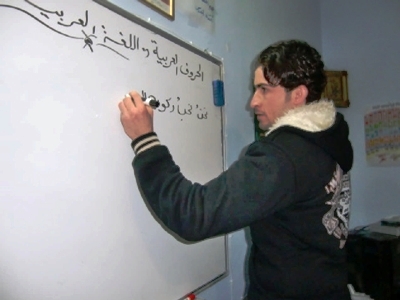![]()
The Words of the Irikura Family
|
|
The Words of the Irikura Family |

Sahab, Jordan -- Young Iraqi men in Jordan want to be able to send messages back to their families, read messages from their families, read newspapers, and use computers. However, some are illiterate. A new project of the Women's Federation for World Peace in Jordan is teaching them to read and write Arabic.
There are few opportunities for Iraqis here, and people feel frustrated and hopeless. There are many single men living in Sahab, a community some distance from the capital, Amman; they have few opportunities and are often forgotten. I wanted to offer them a chance to learn something. Since 2006, we have been serving the Iraqi community in Jordan through our small center, Al Ahalam Tatahaqaq, which means Dreams Come True.
Last year we found a good teacher, Firas, a graduate of Baghdad University. Beginning in November we started offering Arabic and English courses. We are seeing incredible results with Iraqis becoming able to read and write Arabic as well as speak English. This offers them new hope. Here are the stories of two students:
Ahamad from Al Muthana could not read or write Arabic at all. Within three months, he has learned to read and write Arabic well enough to send messages to his families and friends in Iraq. This is a great benefit to him, and he is so happy to be able to communicate with his relatives.
Mohammad from Al Nasreyi was unable to attend school at all due to his family's economic situation; instead he had to work to help his family. After studying for three months in our center, he is now able to communicate with his family by Internet and read advertisements. This has completely changed his life.
I'd like to mention the wonderful English classes being offered by American volunteers who are studying Arabic in Jordan. Not only are they studying hard to achieve their own goals but they are offering their time to Iraqis.
There are an estimated 4.5 million displaced Iraqis, more than half of them inside Iraq. Of the rest, 1.4 million are in Syria and an estimated 700,000 to 1 million in Jordan.
The first waves of Iraqis who fled to Jordan were generally well educated and brought money for living expenses. As the violence got worse, poorer Iraqis followed, with few or no resources. Under the previous Iraqi regime, people in the south had limited educational opportunities. Schools, universities and health care centers weren't built. What schools there were lacked basic equipment and qualified staff. For village children to attend school, they had ride a bus 10 to 20 kilometers to school, and their families needed their children to stay home work. The regime kept the young people illiterate so they could not get an education and become professors, doctors, engineers, or judges.
Furthermore, many families in the south lost a father or elder brother in the war or sentenced to death with or without cause. As a result, parents did not want to register their children's birth because they could then be conscripted into the army when they grew older. Such children were unable to attend school; they could not even receive food rations or medical care because, on paper, they do not exist.
With its 6 million people, many of them refugees from Palestine and other places, the arrival of so many Iraqis has put a large strain on Jordan economically and socially. In theory, Iraqis who fled their country have three options: repatriation to Iraq (the ongoing conflict is a challenge, but 32,500 returned in 2009), absorption and integration into their present country (which Jordanian policy does not permit), and resettlement to a third country (in 2008, the UN High Commissioner of Refugees resettled 18,000 in Europe and the US, and about the same number in the first nine months of 2009).
For those without documentation or education, the situation is especially difficult. They are at risk of deportation and have not been allowed to work; education and medical care have not been available. Few people realize the extent of this tragedy, and NGOs providing assistance to Iraqis are overwhelmed.